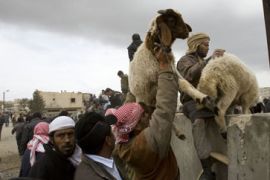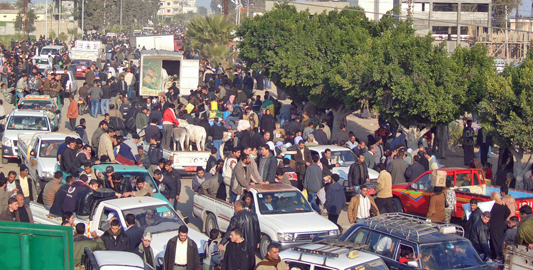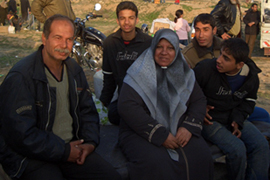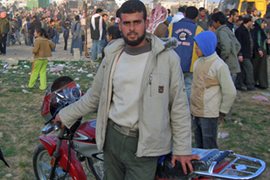Gazans’ shopping spree in Rafah
Palestinians seeking foods and medicines in Egypt find prices too expensive.

 |
|
Tens of thousands of Palestinians crossed the border into Egypt [Adam El Sehemy] |
When Hamas fighters blew holes in the Rafah border wall with Egypt last weekend, teeming masses of Gazans flooded through, beset by sheer desperation in search of food and medicines.
Men, women and children at the end of their tether had been tested to their limits by an Israeli blockade which had slowly deprived Gazans of the most basic of commodities.
In every market place in every Egyptian village and town near the Gaza border, thousands of families engaged in what could only be described as the shopping spree of the poor.
Hatem Hussain travelled 45km from his home in Bait Lahya in northern Gaza with his wife and son and had been in Rafah for two days buying household goods.
He showed Al Jazeera sponge mattresses he had bought for his home.
His son was eating from a bag of crisps, one of dozens Hussain bought for his children.
“Gaza has nothing, so everyone came here to buy their necessities. As you can see, these people are dead,” he said.
“There is no life in Bait Lahya. Those who are sick can’t go anywhere for treatment, nor students studying abroad or people working abroad. All of this is because of the siege. Life is difficult.”
On Saturday, there were reports the Egyptian government had ordered shops shut in Rafah, as well as in the town of El-Arish, 50km from Rafah.
Price gouging
 |
| Umm Ramadan’s family struggled to afford goods in Egypt [Adam El Sehemy] |
But many Egyptian merchants still sold their wares to Palestinian shoppers who continued to cross the border.
By Sunday, many store shelves were empty and fuel supplies were exhausted in Rafah and El-Arish.
Some Palestinians accused Egyptian traders of price gouging; Hussain said that some shops were exploiting the situation by raising prices for goods he knew had been much cheaper on his previous visits to Egypt.
Currency exchange rates have also been affected: Palestine has no national currency and Gazans carry Israeli shekels. While the government exchange rate is set at 1.50 Egyptian pounds for every shekel, a black market exchange rate was quickly established, devaluing the Israeli currency by as much as 30 per cent.
On Sunday, Egyptian currency traders had set a parity between the shekel and the Egyptian pound but some stores bypassed the pound entirely and started accepting Israeli currency.
Umm Ramadan, who came to Rafah from the Palestinian town of Al-Daraj, said she was disappointed that Egyptian traders had hiked the prices of nearly all basic items.
She said: “We are unable to buy anything, they exploited this opportunity. The shekel is considered equivalent to the [Egyptian] pound. We lack medicine, gas, electricity … the life we live is intolerable.”
Her mother, the family matriarch said: “We want to live like other people, we are locked up. We cannot see our families… and we came here to buy and we don’t have enough money to buy, everything is expensive here.”
Thankful
 |
| Egdeeh bought a motorbike in Egypt [Adam El Sehemy] |
But Sameer Egdeeh, a policeman from Khan Younis, which lies 65km from Rafah, says he is thankful Egyptian authorities allowed Palestinians a reprieve from the Israeli-enforced economic blockade.
He told Al Jazeera: “We want to thank the Egyptians for allowing Palestinians to buy their goods after the siege. Egyptians feel the suffering of the Palestinian people.”
Egdeeh had purchased a motorcycle in El-Araish because he says it requires less fuel than a car, a logical idea with dwindling fuel supplies in the Gaza Strip. Egdeeh also bought gas from Rafah.
He explained that there was no water or electricity in Gaza but that things had improved slightly when Israel began allowing limited amount of fuel to reopen Gaza’s only power plant.
Anger
While some Palestinians did express gratitude at Egyptian ‘solidarity’, they directed their bitterness and anger at other Arab countries.
Egdeeh said: “I want the Arabs to remember the youth of Gaza being killed as they watch on television. We want their help, we defend Al Aqsa Mosque and that is for all the Arabs. This isn’t just about the Palestinians, it concerns us all.”
Hussain, on the other hand, said: “It’s a problem to ask anything from the Arabs.”
“To expect a dead person to do something for you is difficult. All I ask them to look at the children of Gaza, not even the others, just the children who are dying from the siege. Take a little look at them that’s all.”